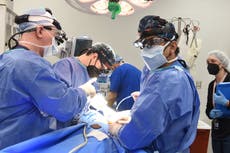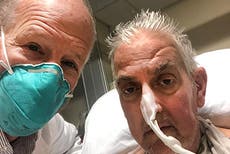Man who received first pig heart transplant dies two months after experimental surgery
The experimental transplant, using the heart of a genetically modified pig, had been the first of its kind
A patient who received a pig’s heart in an experimental surgery has died just two months later, his hospital says.
David Bennett Sr, of Maryland, was 57. In January he underwent the groundbreaking operation – the first of its kind – after being deemed ineligible for a normal heart transplant. For about two months, the heart of a genetically modified pig kept him alive.
“It creates the pulse, it creates the pressure, it is his heart,” Dr Bartley Griffith, director of the cardiac transplant program at the University of Maryland Medical Center, toldThe New York Timesshortly after the surgery. “It’s working and it looks normal. We are thrilled, but we don’t know what tomorrow will bring us.”
The University of Maryland did not specify Mr Bennett’s exact cause of death, but said his condition had been worsening over the past few days. He died at the medical center.
“We are devastated by the loss of Mr Bennett,” Dr Bartley Griffith, who performed the surgery, said in a statement. “He proved to be a brave and noble patient who fought all the way to the end.”
Mr Bennett’s son, David Bennett Jr, thanked the hospital for doing all it could.
“We are grateful for every innovative moment, every crazy dream, every sleepless night that went into this historic effort,” the younger Mr Bennett wrote. “We also hope that what was learned from his surgery will benefit future patients and hopefully one day, end the organ shortage that costs so many lives each year.”
For many, the January transplant had sparked hope that similar surgeries – known as xenotransplantations – could help the huge number of patients in need of new organs. According to the Associated Press, there are more than 106,000 Americans on the national waiting list for organ donations. Thousands die every year before getting one.
So when the transplant of a pig’s heart appeared to save Mr Bennett’s life, it was a cause of excitement. For weeks, Mr Bennett appeared to get better, and the Maryland medical center posted updates on his latest activities. In late February, the hospital posted a video of him watching the Super Bowl and faintly singing along with the national anthem.
On Wednesday, a spokesperson for the University of Maryland School of Medicine told The Independent there was no obvious cause of Mr Bennett’s death, and his doctors are reviewing what happened. They plan to publish their findings in a scientific journal.
But according to Dr Muhammad Mohiuddin, director of the Cardiac Xenotransplantation Program at the university, doctors have already learned a great deal from Mr Bennett’s experience.
“We are grateful to Mr Bennett for his unique and historic role in helping to contribute to a vast array of knowledge to the field of xenotransplantation,” Dr Mohiuddin wrote.
Join our commenting forum
Join thought-provoking conversations, follow other Independent readers and see their replies
Comments




Bookmark popover
Removed from bookmarks